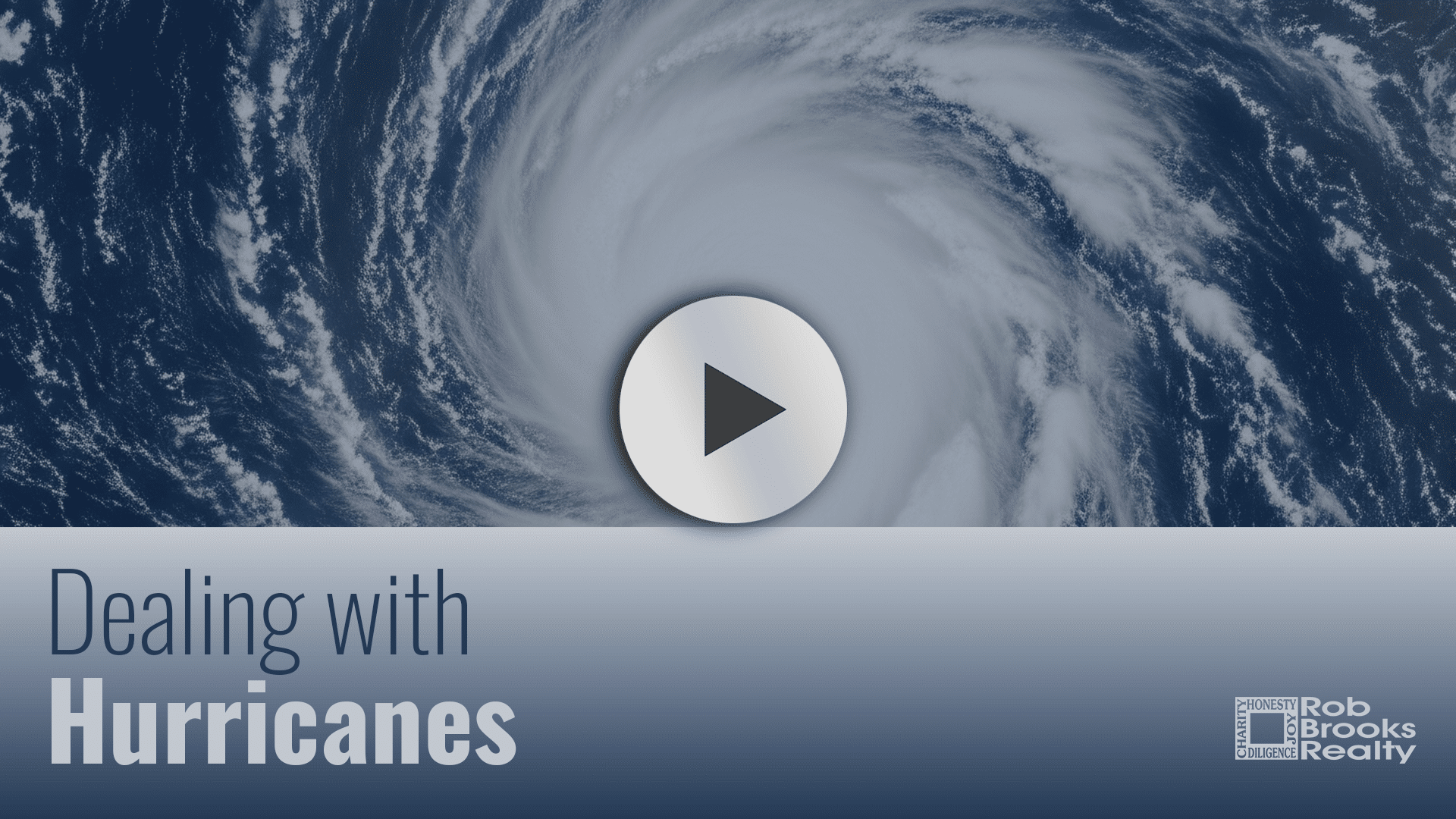Advice for Property Investors
This video covers our comprehensive approach to hurricane preparedness and response. We detail steps for property owners and how Rob Brooks Realty Property Management prepares tenants. The video also reviews our post-hurricane actions taken by property managers, including tenant check-ins and damage assessment for insurance purposes.
Topics discussed
- Hurricane preparation for properties (for owners)
- Hurricane preparation for tenants
- Post-hurricane actions by property management
- Challenges for property managers during hurricanes
Transcript
Hello, everybody! I'm Michael Gregg with Rob Brooks Realty and Property Management, and this is Rob Brooks himself. We're here together to talk about a very important issue near to us on the Emerald Coast: hurricanes. For six months out of the year, we're always watching the news to see which next hurricane is forming. And not only do we worry about it, but we have a multitude of homeowners and tenants we have to worry about as well.
So Rob, what are some of the things we can do to prepare for a hurricane, and specifically, what do we do with properties to prepare for hurricanes?
For the houses, there are certain things that you, as the owner of a house we are managing, can do to help secure that property. One is if the roof is newer, that helps a lot. Older roofs, you're always seeing where roofs get ripped off during a direct hit. Generally, unless it is a Category Four or Five, usually that was an older roof—a roof that has been there for 10-plus years. If you have an older roof, it helps to get that roof replaced sooner rather than later because those shingles tend to stay during most of the hurricanes, at least the lower category hurricanes.
Another thing is to have hurricane shutters available. There are different kinds out there. Having hurricane shutters reduces the damage that can be done inside the property from flying debris breaking windows and then water coming into your house. The ultimate, which is the most expensive, is to have shatterproof glass. They make that, and it's used on a regular basis here on the Emerald Coast. It is the most expensive option, but it certainly does make it easy, especially when you're given a guarantee that it doesn't matter whether the tenants put up their hurricane shutters or not.
And thanks for that. Now, how do we prepare the tenants themselves for incoming hurricanes?
When tenants are faced with a hurricane, a lot of them have never been through one before. They might be military, and now they're here locally and finding out they're about to ride out their first hurricane. We've got to calm them down because a lot of times they're really concerned about what's about to happen; they've seen catastrophic kinds of photos, and that's generally not the case unless it is a direct hit right on the beach where the catastrophe happens. Otherwise, you're just talking about damage and minimizing that damage.
So, we calm the fears of the tenants, give them resources of where they can go. Then, we talk to them about the house. We tell them to move any outdoor debris inside the garage so we don't have debris flying during a hurricane. And then we tell them to put the hurricane shutters on. You need to know as owners that we tell them to put the hurricane shutters on. We talk about how it's important to them that they put on the hurricane shutters because it doesn't just protect your house as the owner, but it also protects their stuff. We talk about that in our communication to tenants, and they generally agree.
We can't guarantee that your house's hurricane shutters are going to go up because we can't force a tenant to put up those hurricane shutters, and we can't go put up the hurricane shutters for you because we have many properties. When a hurricane's coming, there's only a certain amount of time. If you have hurricane shutters and you want to guarantee that those shutters get put up, then you need to contract with a local handyman or something to get those shutters up if that day ever comes. Have it agreed upon ahead of time, months ahead of time.
There are a lot of things that I thank you for asking about, both how to prepare the house and how we prepare the tenants. I did a whole "prepare your house for a hurricane" series that talks about trees and how close they are and other things that can help you in lowering the risk for your houses that can be done months ahead of time before the hurricane.
And Rob, what are some considerations after hurricanes?
After the hurricane passes through, it's all hands on deck for our property management. We're finding that there's kind of a calm after the hurricane has happened and passed through, but it's not a calm for us; it's a very busy time because we're contacting every tenant. One, we ask, "Are you safe? Are you okay?" Two, we ask, "How's the property look?" A lot of times they'll say the property looks fine. We then say, "If you can safely do this, please go outside and take pictures of the roof, and please go look at the ceilings throughout the house to make sure that you don't see any stains on your ceilings."
We take those pictures that come in from the roof, and we know they're not professional photographers; they're just helping out. But we're looking for missing shingles, and in particular, are there things as the owner that you need to report to your insurance company immediately? Because that has to be reported to the insurance company immediately because they're about to get inundated with phone calls, and you want to be first. We're trying to make you first, so we ask these tenants to provide this.
After we've called all these tenants, for the properties that look like there may be an issue, we go visit them in person and we see what the damage is, what needs to be done. We take photos ourselves so that you as the owner can have the material, the stuff that you can give to your insurance company—the ammo, that was the word I was thinking of—the ammo that you can give the insurance companies so that they can say, "Okay, yeah, we've got to process this claim."
One thing I'm going to mention, too: keep in mind that yes, we are working to protect your property, to make sure that you are taken care of with your property and that your risks are lowered. Please keep in mind that our property managers and I, we're people too; we have just gone through a hurricane ourselves, and we also experience those 140-mile-an-hour winds or whatever, and we have our own house and our own things that we're trying to take care of too. Have a little bit of grace and flexibility. You are important to us, and we're going to take care of you.
Well, thank you so much, Rob. I appreciate that; I'm sure our listeners do as well. Thank you so much for joining us today in Fort Walton Beach, Florida, and for all your property management needs or real estate needs, I'm Michael Gregg with Rob Brooks Realty, and this is Rob Brooks. Thank you all for joining us.
Start a conversation with our team
Let us help you think through the best strategy for your property. Get in contact with our property management team today.




